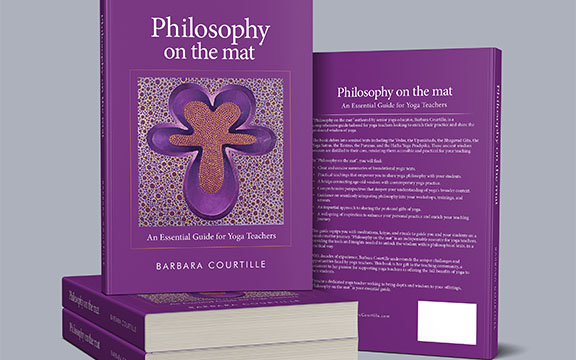
Cover of new book by Barbara Courtille.
Philosophy on the Mat: An Essential Guide for Yoga Teachers, a new book by Yoga educator, author and artist Barbara Courtille, is a comprehensive guide tailored for Yoga teachers looking to enrich their practice and share the profound wisdom of Yoga. It includes clear and concise summaries of foundational yogic texts as well as tools and insights to unlock the wisdom within these texts in a practical way. Inspired by the book, this article gives an overview of the evolution and significance of Yoga philosophy in contemporary contexts. It traces Yoga from its spiritual origins to its modern applications.
Yoga, historically a spiritual and meditative discipline, was crafted to guide practitioners towards enlightenment through a profound connection between mind, body, and spirit. Its purpose transcended physical postures, aiming to foster self-awareness, inner peace, and a transcendent understanding of existence.
In the modern era, Yoga has evolved to encompass physical, mental, and spiritual dimensions, offering comprehensive benefits for overall well-being. Physically, Yoga enhances flexibility, strength, and balance. Mentally, it reduces stress and cultivates mindfulness through breath and meditation. Spiritually, even in secular contexts, Yoga fosters connection, purpose, and inner harmony.
Yoga philosophy, rooted in ancient wisdom, equips practitioners with tools to navigate the complexities of modern life. By integrating these teachings, practitioners can nurture resilience, inner peace, and purpose amid life’s challenges.
In the realm of Yoga philosophy, practitioners explore enduring questions about identity, purpose, and existence. The Vedas, Upanishads, Bhagavad Gita, Yoga Sutras, Tantras, Puranas, and Hatha Yoga Pradipika offer diverse perspectives and guidance.
o The Vedas offer insights into the spiritual and ritualistic aspects of Yoga. Highlighting enduring concepts such as the interconnectedness of all life and the importance of ethical conduct. Today, practitioners can draw inspiration from the Vedas to harmonise their inner selves and outside world.
o The Upanishads explore the nature of reality, the Self, and the pursuit of the ultimate Truth. These philosophical scriptures guide practitioners on the path of Self-realization and the quest for meaning. In today’s chaotic world, these teachings resonate with students seeking inner peace and purpose in their lives.
o The Bhagavad Gita offers practical guidance on ethics, duty, and the path to spiritual realization. It enables its followers to align with their natural inclinations by presenting them diverse approaches to practice Yoga. Its teachings on integrating life’s demands with spiritual growth provide valuable insights for practitioners seeking balance in both personal and professional spheres.
o The Yoga Sutras present a classical text that articulates a systematic approach to yoga, incorporating ethical guidelines and meditation. The text provides tools for effective stress management, enhanced mental clarity, attainment of serenity and inner peace. The Yoga Sutras offer a timeless resource offering guidance for navigating the challenges of contemporary life.
o The Tantras highlight the integration of the physical and spiritual realms. Tantra teachings serve as a reminder of the inherent potential for spiritual growth within our daily lives. These sacred texts offer a valuable perspective on bridging the gap between the mundane and the sacred, fostering a holistic approach to spiritual development.
o The Puranas offer a treasure trove of mythology, containing stories that captivate while imparting moral and spiritual lessons. Despite their antiquity, the Puranas offer insightful narratives that resonate with modern students. This connection enhances the learning process, creating an engaging and enlightening bridge between ancient wisdom and contemporary understanding.
o The Hatha Yoga Pradipika marks a significant shift from earlier texts by placing a primary focus on the physical body’s transformation. This departure from tradition persists to this day, and its teachings continue to be relevant in our modern world. The writings equips students with essential tools to cultivate strength, flexibility, and inner peace in their daily lives.
To effectively teach Yoga philosophy, it is crucial to present these concepts in a relevant and accessible manner. Integrating philosophy into Yoga offerings enriches the student experience, fostering personal and spiritual growth. Embrace the journey of exploration and allow the wisdom of these texts to enhance your teaching and personal practice.
About the Author:
 Barbara Courtille was born in Paris and now resides on Cammeraygal land in Sydney, Australia. Even though her Yoga journey began in the late 1980s, it was in 2010 that a brief yet profound experience of samadhi transformed her practice, propelling her from decades of postural Yoga to a newfound sense of peace discovered through meditative practices. Motivated by this transformative encounter, Barbara sought guidance in meditation, philosophy, and devotional practices, unearthing a deeper connection to the spiritual dimensions of Yoga. Barbara continues to enhance her spiritual connection through dedicated study, writing and practice. Exploring Yoga philosophy informs the support she offers to aspiring Yoga teachers, dedicating herself wholeheartedly with devotion and kindness.
Barbara Courtille was born in Paris and now resides on Cammeraygal land in Sydney, Australia. Even though her Yoga journey began in the late 1980s, it was in 2010 that a brief yet profound experience of samadhi transformed her practice, propelling her from decades of postural Yoga to a newfound sense of peace discovered through meditative practices. Motivated by this transformative encounter, Barbara sought guidance in meditation, philosophy, and devotional practices, unearthing a deeper connection to the spiritual dimensions of Yoga. Barbara continues to enhance her spiritual connection through dedicated study, writing and practice. Exploring Yoga philosophy informs the support she offers to aspiring Yoga teachers, dedicating herself wholeheartedly with devotion and kindness.

